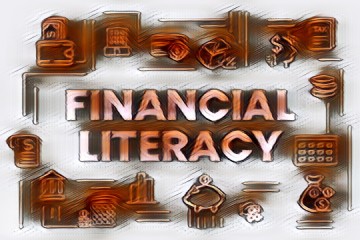Lesson 1: Introduction to Financial Literacy
At ayu, we have thus far focused on lessons for kids and young adults from the age of 5 until 17. As a next step, we are now creating a series of lessons for young adults aged 18 to 22. These lessons will start from the very basics i.e. you don't need to know about the concepts covered in the earlier short lessons. These lessons are aimed at making our young adults financially smart and aware, as they enter the workforce, and thus set them up for success.
We start the first lesson with some basic concepts today.
What is Financial Literacy?
Financial literacy refers to the knowledge and skills necessary to understand and manage your finances effectively. It involves developing an understanding of basic financial concepts, such as budgeting, saving, and investing. By acquiring financial literacy, you can make informed decisions about spending, saving, and investing, enabling you to achieve financial stability and work towards your long-term goals.
Note that Financial literacy is more than just understanding numbers and managing money; it empowers you to make informed decisions and achieve your long-term financial goals.
Why is this Important?
Financial literacy is essential because it equips you with the tools to make informed financial decisions and navigate the complexities of the financial world. Without financial literacy, you may fall into common pitfalls such as overspending, high debt, or poor investment choices. By becoming financially literate, you gain the knowledge and skills to budget effectively, manage debt, build savings, and make sound investment decisions, setting yourself up for a more secure and prosperous future.
Key concept: Needs, Wants, and Desires
One crucial concept in financial literacy is distinguishing between needs, wants, and desires. Needs are essential for survival and include things like food, shelter, clothing, and healthcare. Wants are things we desire but can live without, such as entertainment, dining out, or luxury items. Desires encompass our aspirations and dreams, like traveling the world or owning a home. By understanding these distinctions, you can prioritize your spending and make wise financial choices that align with your goals.
Key concept: Budgeting
Budgeting is a foundational skill in financial literacy. It involves creating a plan for managing your income and expenses. By budgeting, you allocate your money intentionally, ensuring that every dollar has a purpose. Budgeting provides a clear picture of your financial situation, helps you control spending, and allows you to save and invest wisely. It's an effective tool for managing your finances, reducing stress, and working towards your financial goals.
Creating a Budget
To create a budget, start by tracking your income and expenses. Track all the money you receive, such as wages, allowances, or any other regular income sources. Then, categorize your expenses into different categories like housing, transportation, groceries, entertainment, and savings. It's essential to be thorough and include all your expenses to get an accurate picture of your spending habits. This will help you identify areas where you can reduce expenses and save more effectively.
Differentiating Between Fixed and Variable Expenses
Within your budget, it's important to differentiate between fixed and variable expenses. Fixed expenses are those that remain relatively constant each month, such as rent or mortgage payments, utilities, and loan repayments. Variable expenses, on the other hand, fluctuate from month to month, such as groceries, entertainment, and dining out. Understanding the difference between these two types of expenses will help you allocate your money effectively and prioritize your needs over wants.
Developing Financial Awareness
As you embark on your financial literacy journey, developing financial awareness is key. Monitor your financial accounts regularly, review bank statements, and keep track of your expenses. By understanding where your money is going, you can identify areas where you can reduce expenses and make adjustments to stay within your budget. Take advantage of technology and personal finance apps that can help you track your spending, categorize expenses, and set financial goals. This level of awareness will empower you to make informed financial decisions and maintain control over your finances.
Congratulations on taking the first steps toward building a solid foundation in financial literacy! By understanding the importance of financial literacy, distinguishing between needs, wants, and desires, and embracing the key concept of budgeting, you are well on your way to achieving financial stability and success. Remember, financial literacy is a lifelong journey, and as you continue to learn and grow, you will gain the knowledge and skills to make informed financial decisions that align with your goals and aspirations. Stay curious, stay committed, and watch as your financial future unfolds with confidence.

@ayuecosystem #kids #youngadults #financialliteracy #finance #FinancialLiteracy101 #MoneyMatters #PersonalFinanceTips #BudgetingBasics #SavingsGoals #DebtManagement #FinancialEducation #SmartMoneyChoices #FinancialAwareness #BuildingWealth #YoungAdultFinance #FinancialWellbeing #FinancialEmpowerment #InvestingForTheFuture #SpendingWisely #FinancialSuccess #MoneySkills #FinancialIndependence #MoneyManagement101